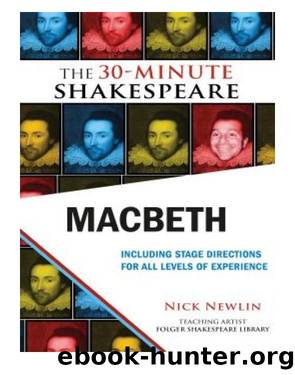Macbeth: The 30-Minute Shakespeare by Newlin Nick;Shakespeare William;

Author:Newlin, Nick;Shakespeare, William;
Language: eng
Format: epub
Publisher: Nicolo Whimsey Press
Published: 2010-07-27T00:00:00+00:00
CASTING THE PLAY
Young people can be self-conscious and nervous with âformalâ auditions, especially if they have little or no acting experience.
I conduct what I call an âinformalâ audition process. I hand out a questionnaire asking students if there is any particular role that they desire, whether they play a musical instrument. To get a feel for them as people, I also ask them to list one or two hobbies or interests. Occasionally this will inform my casting decisions. If someone can juggle, and the play has the part of a Fool, that skill may come in handy. Dancing or martial arts abilities can also be applied to roles.
For the auditions, I do not use the cut script. I have students stand and read from the Folger edition of the complete text in order to hear how they fare with the longer passages. I encourage them to breathe and carry their vocal energy all the way to the end of a long line of text. I also urge them to play with diction, projection, modulation, and dynamics, elements of speech that we have worked on in our vocal warm-ups and theater games.
I base my casting choices largely on reading ability, vocal strength, and enthusiasm for the project. If someone has requested a particular role, I try to honor that request. I explain that even with a small part, an actor can create a vivid character that adds a lot to the play. Wide variations in personality types can be utilized: if there are two students cast as Romeo, one brooding and one effusive, I try to put the more brooding Romeo in an early lovelorn scene, and place the effusive Romeo in the balcony scene. Occasionally one gets lucky, and the doubling of characters provides a way to match personality types with different aspects of a characterâs personality. But also be aware of the potential serendipity of non-traditional casting. For example, I have had one of the smallest students in the class play a powerful Othello. True power comes from within!
Generally, I have more females than males in a class, so women are more likely (and more willing) to play male characters than vice versa. Rare is the high school boy who is brave enough to play a female character, which is unfortunate because it can reap hilarious results.
Download
This site does not store any files on its server. We only index and link to content provided by other sites. Please contact the content providers to delete copyright contents if any and email us, we'll remove relevant links or contents immediately.
| Acting & Auditioning | Broadway & Musicals |
| Circus | Direction & Production |
| History & Criticism | Miming |
| Playwriting | Puppets & Puppetry |
| Stage Lighting | Stagecraft |
Call Me by Your Name by André Aciman(18989)
Ready Player One by Cline Ernest(12863)
How to Be a Bawse: A Guide to Conquering Life by Lilly Singh(6701)
Wiseguy by Nicholas Pileggi(4601)
The Kite Runner by Khaled Hosseini(4473)
On Writing A Memoir of the Craft by Stephen King(4221)
The Crown by Robert Lacey(4115)
Audition by Ryu Murakami(4107)
Call me by your name by Andre Aciman(4080)
Harry Potter and the Cursed Child: The Journey by Harry Potter Theatrical Productions(3983)
Gerald's Game by Stephen King(3927)
The Perils of Being Moderately Famous by Soha Ali Khan(3790)
Dialogue by Robert McKee(3593)
Dynamic Alignment Through Imagery by Eric Franklin(3499)
Apollo 8 by Jeffrey Kluger(3205)
How to be Champion: My Autobiography by Sarah Millican(3193)
Seriously... I'm Kidding by Ellen DeGeneres(3106)
Darker by E L James(3093)
History of Dance, 2E by Gayle Kassing(3001)
